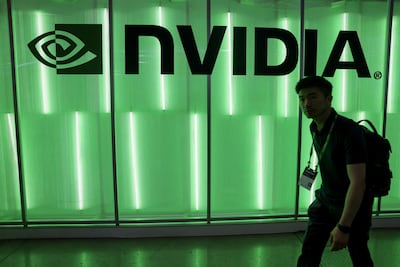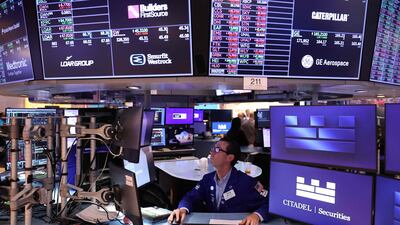US stocks extended their decline on Wednesday, with technology shares once again leading losses, as concerns over economic weakness and investor fatigue in the artificial intelligence sector intensified.
Analysts caution that market volatility will stay longer as Nvidia’s sharp decline causes concerns about the sustainability of inflated tech valuations.
Nasdaq Composite, which includes top tech firm such as Apple, Microsoft and Nvidia, was down 0.30 per cent at $17,084.30 on Wednesday. While the S&P 500, which tracks large-cap US companies, edged 0.16 per cent lower to $5,520.07. However, the Dow Jones Industrial Average was up almost 0.01 per cent at $40,974.97.
AI chip maker Nvidia, which dropped almost 10 per cent on Tuesday, was trading 1.66 per cent down at $106.21 a share at market close on Wednesday. Apple and Alphabet were down 0.86 per cent and 0.50 per cent, respectively. While Tesla and Meta were up 4.18 per cent and 0.19 per cent, respectively.
The sell-off in AI stocks like Nvidia is not a collapse but a “reality check” as sky-high valuations and rate hikes are forcing a reassessment, said Naeem Aslam, chief investment officer at Zaye Capital Markets.

“This is recalibration, not a rout … tech volatility is the new normal. With the euphoria fading, investors are waking up to a tougher landscape where growth must be earned, not hyped. Brace for more turbulence,” Mr Aslam told The National.
After all the excitement around AI, it's "only natural for the market to take a breather, and factors like inflation and rising interest rates are probably making investors more cautious", Robert Hodgins, founder of Florida-based Sand Hill Road Technologies Fund, told The National.
“We are likely to see more ups and downs in the near future, but the long-term prospects of AI still look strong.”
Investors adopting risk-off mode
Imminent recession fears and potential US Federal Reserve rate cuts are leading investors to stay in a risk-off mode, with further downside likely if the upcoming US jobs data does not ease concerns, industry experts said.
In a risk-off mode, investors adopt a cautious approach and minimise their exposure to riskier assets due to economic uncertainty. Instead, they opt for safer assets such as government bonds or gold.
The US bureau of labour statistics is expected to release job openings and labour turnover survey, known as JOLTS, on Wednesday. It is expected to show that job openings fell to 8.1 million in July, down from June's nearly 8.2 million jobs.
US manufacturing activity also remained slow in August, which further heightened concerns about an economic slowdown.
Only 47.2 per cent of US factories expanded last month, missing the Dow Jones consensus for 47.9 per cent per cent, according to the Institute for Supply Management’s monthly survey of purchasing managers. It remained below the 50 per cent break even point that signals expansion or contraction in activity.
chief investment officer at Zaye Capital Markets
“Demand remains subdued, as companies show an unwillingness to invest in capital and inventory due to current federal monetary policy and election uncertainty,” said Timothy Fiore, chair of the ISM manufacturing business survey committee.
Another US manufacturing purchasing managers’ index reading from S&P Global supported the ISM results, showing a decline to 47.9 in August, down from 49.6 in July.
“The US equities tumbled after the latest ISM data showed a fifth month of contraction in the US manufacturing, and at accelerated pace,” Ipek Ozkardeskaya, senior analyst at Swissquote Bank said in a note on Wednesday.
“The technology stocks led losses … Nvidia tumbled as part of the broader macroeconomic worries and suspected AI fatigue … [and] on news that the DoJ sent subpoenas to the company because it suspects that Nvidia violated antitrust laws, made switching harder to other chipmakers and penalised companies that didn’t use Nvidia’s AI chips exclusively,” she added.
Meanwhile, Asian and European shares also tumbled on Wednesday.
In Asia, Taiwan Semiconductor Manufacturing remained flat while South Korea’s SK Hynix dropped more than 8 per cent and Japan’s Nikkei dipped 4.24 per cent. Hong Kong's Hang Seng index dropped 1.10 per cent, while the Shanghai Composite fell 0.67 per cent.
EURO STOXX 50 futures slumped more than 1.15 per cent, London's FTSE 100 dropped 0.46 per cent, and the Paris CAC 40 slipped 0.92 per cent on Wednesday.
Global market volatility is here to stay, Arun John, chief market analyst at Century Financial, told The National.
“The fading tech euphoria is sparking more frequent market swings, eroding overall confidence and dampening the appetite for leverage and buy-the-dip strategies.
“This market turbulence is likely to persist, especially with the [US] presidential debate on September 10, followed by a Fed meeting just a week later. All eyes are on Friday’s US payrolls report, alongside fresh insights into the performance of the services sector,” Mr John said.
Will a Fed rate cut boost markets?
The Fed has held its benchmark rate steady since July 2023. The Fed may begin cutting interest rates for the first time in four years at its meeting on September 17 and September 18.
“The rate cuts might ease the fall, but they won’t stop the bleeding … expect choppy waters ahead across all markets,” Mr Aslam said.
“Asian markets, especially emerging economies, might see some capital inflows as global liquidity loosens, but they remain vulnerable to export slowdowns and currency volatility. In Europe, rate cuts could offer a breather amid energy crises and sluggish growth, but don't expect a miracle cure,” he added.
Is Nvidia's fall a buying opportunity?
Nvidia shares dropped almost 10 per cent on Tuesday, erasing $278.9 billion in value. This was the biggest single-day loss ever for a US stock, according to data compiled by financial advisory and asset management firm deVere.
However, despite the recent turmoil, Nvidia remains at the forefront of the AI revolution, Nigel Green, deVere’s chief executive, said.
“Nvidia is still up 118 per cent for the year … the market may be reacting to short-term concerns, but Nvidia’s role in the future of AI remains solid. This dip should be viewed as a temporary setback, not a sign of declining relevance.”
Mr Green suggests investors should not write-off the chip manufacturer and should consider it as a buying opportunity.
“Nvidia’s sharp drop offers an attractive entry point into a company … [it’s] fundamentals remain strong, and this correction provides a chance to accumulate shares at a discount.”


